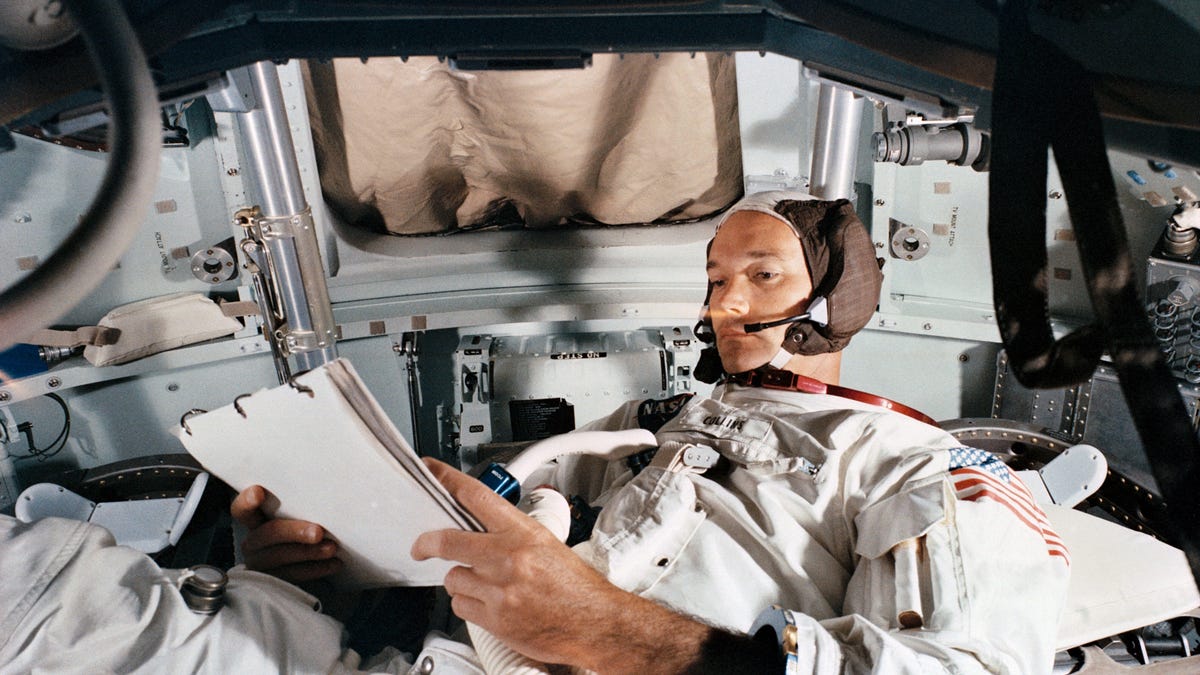Are rocket scientists and brain surgeons actually smarter than everyone else?
A comprehensive study puts the phrase "it's not rocket science" to the test, literally.

On June 19, 1969, a month before the moon landing, Michael Collins gets some training in the command module simulator at the Kennedy Space Center.
Imagine a room full of rocket scientists and brain surgeons. Now, sprinkle in a few members of the general public. Did the group's average intelligence profile just decrease? Probably not, according to scientists who spent a full year studying whether the phrases "it's not rocket science" and "it's not brain surgery" have any foundational truth.
Using a modified IQ test called Cognitron that looks at various aspects of "intelligence," they actually assessed the cognitive abilities of 600 aerospace engineers and 148 neurosurgeons, cleaned the data for accuracy, then cross-checked the results with over 18,000 members of Britain's general public.
Short answer: There were no significant gaps between scores of the so-called cream of the clever crop and everyone else.
"The fact that there weren't massive differences is, I think, a real take-home message," said Aswin Chari, a neurosurgical trainee himself at Great Ormond Street hospital in the UK, and an author of the study published Monday in The BMJ.
Applying that message to prevailing stigmas about STEM careers, he added, "if there are school children who want to go down a certain path, and feel that there are these perceptions or stereotypes stopping them from doing that, then this, I think, pretty conclusively proves those are not true."
Really zooming into the details, however, brain surgeons might have earned one bragging right and exposed a slight disadvantage of theirs.
Neurosurgeons were reportedly faster at problem solving than the general public "probably because we have to make a lot of time-critical decisions as part of our daily work," Chari said, calling on his own experience. On the flip side, they were slower at memory recall, which he speculates is "probably because we don't really need that" in the practice.
I guess if you must choose from these two idioms while explaining the ease of something, your best bet is to pick "it's not brain surgery" -- unless the topic has to do with excavating old memories or playing Trivial Pursuit.
But wait, what happens when we pit rocket scientists and brain surgeons against each other?
Rocket science vs. brain surgery
"I think we originally started it hoping to find a winner," Chari said of his fellow neuroscientists getting to the root of the intelligence debate. "We very much thought the rocket scientists would blow us out of the water."
Rather than reveal a clear-cut victor, comparing the test results of the two professions highlighted a few nuances in how they uniquely express cognitive ability.
"The neurosurgeons were better at semantic problem solving," Chari said, which is essentially the ability to find definitions of very rare words. "We think this is because they learned -- we learn -- a lot of medical Greek and Latin origin terms as part of medical school."
Meanwhile, rocket scientists were better at mental manipulation, which is basically moving around 3D objects in their head and seeing them from a different perspective. It makes sense, given the profession's need to visualize stars, galaxies and intangible laws of physics on the regular.
Although, admitting he doesn't feel his own status as a neurosurgeon aids in learning new languages or words, Chari says the study population may not be fully representative of the global population. "It's a relatively limited sample" as the call for scientist subjects was restricted to mailing lists of neurosurgical and rocket science societies.
"We don't really know how many people that reached," he said. "Therefore, we don't know what the response rate is."
And on the note of variables to correct for when considering the study results, Chari relayed that the vast majority of the comparison population, or general public cohort, were white, had a university degree or high school education, and shared other factors like a connection to Britain. "But we felt that it's still relatively robust because the sample sizes are quite big -- so, we think that the take-home messages are still strong."
Can we define intelligence?
"The kind of ethos of the Cognitron folk is that there is no one single IQ measure," Chari said. "Actually, it's more useful to have a more granular approach of knowing how people perform over a range of different types of intelligence."
Instead of viewing IQ as a blanket concept -- which many argue the more classical IQ test Mensa does -- Cognitron takes into consideration a wider range of "intelligence," to tease apart distinct domains including planning, language and reasoning.
But still, it's an objective test.
"I think there's a finite kind of level of things that you can know at any one time," Chari said. "You end up in a field in which you are performing well because you have the skills required of that particular field, so it's very difficult to be good at everything."
In a sense, intelligence is so specific and subjective that perhaps there isn't a test, or even a definition, worthy of assessing how much of it someone has. Moreover, the main goal of the study, Chari said, goes beyond simply realizing whether "it's not rocket science" and "it's not brain surgery" has any value.
In tandem with his friend and co-author's charity called BrainBook, which aims to demystify neurosurgery for both medical students and patients, he hopes the study reframes hard scientific disciplines as attainable and approachable. Going forth, Chari intends to pivot back to the research at the forefront of his career, which deals with unraveling the mechanisms behind childhood epilepsy.
"This was my side gig," he said with a laugh, but "I love where it ended up."

